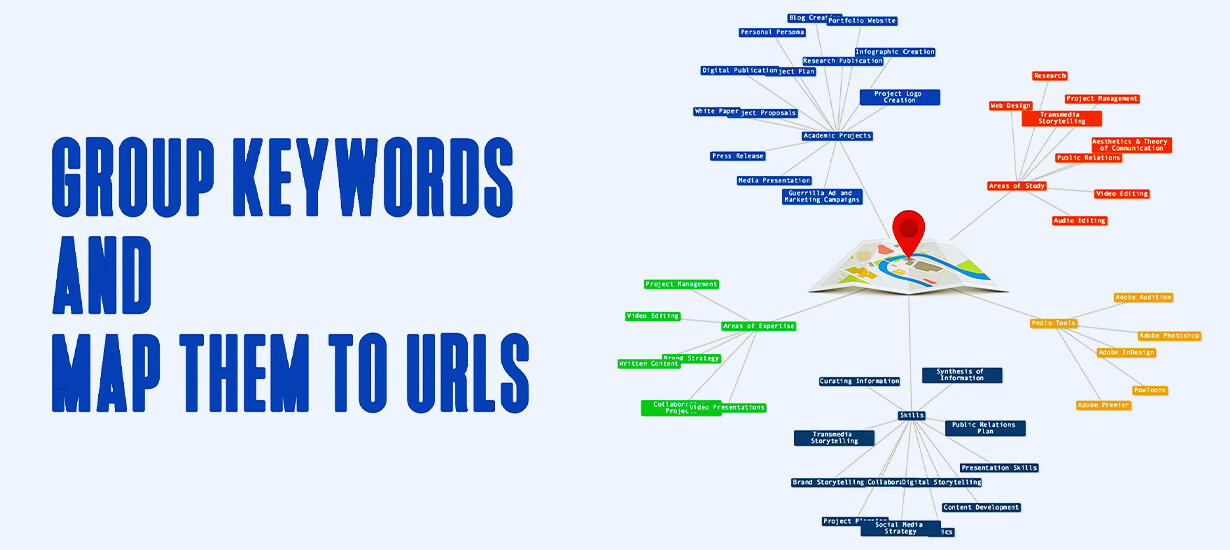Local keyword research involves identifying search queries used on Google to find local services or products. This includes adding location-specific terms like city or neighborhood names alongside industry-related keywords to attract local customers.
You can conduct local keyword research by listing solutions and locations relevant to your business. By analyzing local metrics and competitor rankings, you can find suitable local keywords and prioritize them. In the end, map your keywords to the appropriate URLs.
We’ll discuss a step-by-step guide for local keyword research. We'll cover listing your services, checking for local intent, and analyzing search volumes. We'll also discuss how to group keywords effectively, consider handling multiple locations, and integrate local keywords into blog posts.
How To Do Local Keyword Research: 5 Steps

Local keyword research is important for businesses. Here are the steps to find and use local keywords.
Step 1: List the Services You Offer
You need to know your business's services before you start keyword research. Whether you're working for a client or your own business, you must do this.
A) Ask or Brainstorm
Start by listing all the services you provide. If this is your business, write the things you already know. Ask clients for a list of their services. Some of the services people provide require more attention, so this process is crucial.
- For example, a plumber might offer:
- Drain unblocking.
- Boiler repairs.
- Boiler installation.
- Boiler servicing.
- Radiator installation.
- Burst pipe repair.
B) Expand Ideas
Brainstorming may uncover only some services people search for. Use tools to find services you might have missed.
- How to find more services:
- Enter your ideas into a Keywords Explorer tool.
- Select your country.
- Review the "Having same terms" report.
This method can reveal services like "combi boiler installation" or "gas boiler installation" that you might have overlooked.
- Focus on discovering services, not just keywords like "plumber" or "plumbing service."
- Use Ahref’s Site Explorer to explore competitor's services.
C) Refine Your List
Consult with your clients to confirm the services they offer. You should add any confirmed services to your initial list.
Step 2: Check for Local Intent

It is important for businesses that wish to target local customers to invest in local SEO. Your business will show up in the search results when people look for local services in their area. Here's how to check if your keywords are localized.
Identifying Local Intent
You can use a few simple methods to figure out if a keyword has local intent:
- Search in Your Area: If you're in the exact location as the business, search for your services on Google.
- Look for a 'map pack,' a set of maps showing local businesses.
- Check if local businesses appear in the organic search results.
- For instance, typing "boiler installation" might display a map pack and local businesses, showing local solid intent.
Using Google’s Ad Preview Tool
If you can't conduct searches from the business's location, Google’s Ad Preview tool can help:
- Steps to Use the Tool:
- You can enter the search term you're looking for (e.g., "boiler installation").
- Set the location to your business area (e.g., Nottingham).
- Perform the search to view local search results.
- Look for local business rankings and a map pack to assess local intent.
Understanding Non-Local Intent
Not all keywords are meant for local SEO. Some might not show any local results:
- Example of Non-Local Keywords:
- A search for "Worcester boiler" may not show local results if the query is primarily about the brand, not a location.
- Such keywords lack a map pack and local business results, showing non-local intent.
Identifying whether a keyword has local intent helps tailor your content and strategy to attract the right audience. Use these tools and methods to refine your approach effectively.
Step 3: Check Search Volumes

Local SEO requires an understanding of search volumes. It helps you decide which pages to focus on, even though major SEO tools often show broader country-wide data. For local businesses, honing in on local search volumes is key to attracting the right audience.
Finding Search Volumes for Implicit Keywords
Implicit keywords are terms where the searcher expects local results without specifying a location. Examples include simple searches like "plumber" or "boiler replacement." Here's a step-by-step method to discover their local search volumes:
- Open Google Keyword Planner.
- Select the option for "Get search volume and forecasts."
- Input your list of keywords.
- Adjust the location settings to your specific service area.
This approach helps you see how often people in your area search for these terms, giving you a clearer picture of local demand.
Finding Search Volumes for Explicit Keywords
Explicit keywords include a specific location within the search query, such as "plumber in Nottingham." These are straightforward to analyze since the location is already provided.
- Choose a reliable keyword research tool.
- Type in the explicit keyword.
- Review the search volume data for the keyword.
By analyzing both implicit and explicit keywords, you can effectively prioritize which pages and services to highlight, ensuring your local SEO strategy targets the right audience.
Step 4: Group Keywords and Map Them To URLs

It's not just about finding popular search terms when doing local keyword research. The use of these keywords on your website needs to be done effectively. You will organize keywords according to your site's layout.
Organize Keywords Effectively
Group your keywords by service and location to help visitors easily find information. This creates a clear, user-friendly structure.
- Organize keywords by each service you offer.
- Consider the specific locations you cater to.
- Match keywords with the existing layout of your website.
Create a Logical Structure
A website is optional for some services. You can make an informed decision by looking at the top search results.
- See if successful pages focus on specific services.
- Determine if each service needs a separate page.
- Use general pages for services that are related or similar.
The main aim is to make your website easy for visitors to use. Create a dedicated page if it provides extra value. If not, a general page should work just fine.
Step 5: Look for ‘Things to Mention’

When you want to boost your local SEO, finding the right things to mention on your webpage is crucial. This step goes beyond just inserting keywords. It's about adding value to your content. Here's why it's important and how you can do it effectively.
Improve Topical Relevance
You can make search engines understand the content of your page by adding relevant information. The result will be a higher ranking.
- Include Various Topics: If your service is boiler repair, mention the types of boilers you fix, your pricing, and the areas you serve. This shows Google the broader context of your services.
- Use Related Terms: Instead of repeating "boiler repair," talk about "gas boiler repair" or "combi boiler repairs."
Rank for Long-Tail Keywords
Capturing long-tail keywords can help you reach niche markets with less competition.
- List Specific Areas: If you serve certain locations, mention them. People searching for "boiler repair North London" might find you more easily.
- Highlight Special Services: Talk about "emergency boiler repair" or "fixed price boiler repair," as these specifics can attract targeted searches.
Optimize Visitor Experience
When your content answers visitor’s questions, they are more likely to choose your service.
- Address Common Concerns: Mention certifications like "Gas Safe registered" or brands you repair, such as "Vaillant" or "Worcester Bosch."
- Answer Questions: Use Google’s "People also ask" to find common queries and address them on your site, like the cost of repairs or service times.
Practical Steps
Here’s how to gather these valuable mentions:
- Research Competitors: Look at top-ranking local pages for similar services. Note what topics they include.
- Use Keyword Tools: Tools like Ahrefs can show you related keywords and questions people frequently ask.
- Manual Checks: Sometimes, the best insights come from reviewing successful competitor pages to see their priorities.
Dealing with Multiple Locations

When your business operates in multiple locations, it's important to manage your online presence effectively. Here's how to handle keywords for each location.
- Create Unique Pages: Develop a separate webpage for each location. This information can help search engines identify your business location.
- Customize Content: Use language and terms that reflect the local culture and preferences. This makes your content more relatable to local customers.
- Feature Locations on Your Website: If you have only a few locations, list them on your contact page. This helps Google rank your homepage for local searches.
Keywords for Blog Posts
You can use blog posts to engage your local audience. By using local keywords, you can make your content more relevant to your community.
- Write About Local Events: Discuss local happenings or issues in your community. This will not only engage readers but also show your local expertise.
- Optimize with Keywords: Include relevant local keywords in your posts. You'll appear in search results when locals look for information.
Tracking Local Keyword Rankings
After setting up your pages and content, tracking your keyword’s performance is crucial. This will help you adjust your strategies for better results.
- Use Analytics Tools: Tools like Ahref’s Rank Tracker can help you monitor your keyword performance. This will show you where you stand in local searches.
- Regular Updates: Monitor your analytics and refine your strategies accordingly. Your content must also be regularly updated to remain effective.
Conclusion
Wrapping up our deep dive into local keyword research, it's clear that mastering this skill can transform your presence in the local market. Focusing on the right local keywords boosts visibility and enhances your relevance and authority in search results.
You can attract the right audience and stay ahead of your competitors by using these strategies. You can successfully adapt to the constantly shifting market landscape with a robust keyword strategy. You will shine brighter than ever if you implement these insights into your business.
FAQs
The concept of automated local SEO refers to using software to manage local SEO with minimal customization. It operates on a "set it and forget it" basis, which can lead to some results. A truly effective local SEO strategy requires customization.

